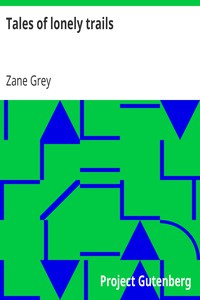Tales of lonely trails by Zane Grey (best affordable ebook reader .TXT) 📗

- Author: Zane Grey
Book online «Tales of lonely trails by Zane Grey (best affordable ebook reader .TXT) 📗». Author Zane Grey
As we climbed out once more, this time into an open, beautiful pine forest, with little patches of green thicket, I seemed to have been drugged by the fragrance and the color and the beauty of the wild. For when Copple called low and sharp: "Hist!" I stared uncomprehendingly at him.
"Deer!" he whispered, pointing. "Get off an' smoke 'em up!"
Something shot through me—a different kind of thrill. Ahead in the open I saw gray, graceful, wild forms trotting away. Like a flash I slid off my horse and jerked out my rifle. I ran forward a few steps. The deer had halted—were gazing at us with heads up and ears high. What a wild beautiful picture! As I raised my rifle they seemed to move and vanish in the green. The hunter in me, roused at last, anathematized my miserable luck. I ran ahead another few steps, to be halted by Copple. "Buck!" he called, sharply. "Hurry!" Then, farther on in the open, out in the sunlight, I saw a noble stag, moving, trotting toward us. Keen, hard, fierce in my intensity, I aligned the sights upon his breast and fired. Straight forward and high he bounded, to fall with a heavy thud.
Copple's horse, startled by my shot, began to snort and plunge. "Good shot," yelled Copple. "He's our meat."
What possessed me I knew not, but I ran ahead of Copple. My eyes searched avidly the bush-dotted ground for my quarry. The rifle felt hot in my tight grip. All inside me was a tumult—eager, keen, wild excitement. The great pines, the green aisles leading away into the woods, the shadows under the thickets, the pine-pitch tang of the air, the loneliness of that lonely forest—all these seemed familiar, sweet, beautiful, things mine alone, things seen and smelled and felt before, things ... Then suddenly I ran right upon my deer, lying motionless, dead I thought. He appeared fairly large, with three-point antlers. I heard Copple's horse thudding the soft earth behind me, and I yelled: "I got him, Ben." That was a moment of exultation.
It ended suddenly. Something halted me. My buck, now scarcely fifteen feet from me, began to shake and struggle. He raised his head, uttering a choking gasp. I heard the flutter of blood in his throat. He raised himself on his front feet and lifted his head high, higher, until his nose pointed skyward and his antlers lay back upon his shoulders. Then a strong convulsion shook him. I heard the shuddering wrestle of his whole body. I heard the gurgle and flow of blood. Saw the smoke of fresh blood and smelled it! I saw a small red spot in his gray breast where my bullet had struck. I saw a great bloody gaping hole on his rump where the.30 Gov't expanding bullet had come out. From end to end that bullet had torn! Yet he was not dead. Straining to rise again!
I saw, felt all this in one flashing instant. And as swiftly my spirit changed. What I might have done I never knew, but most likely I would have shot him through the brain. Only a sudden action of the stag paralyzed all my force. He lowered his head. He saw me. And dying, with lungs and heart and bowels shot to shreds, he edged his stiff front feet toward me, he dragged his afterquarters, he slid, he flopped, he skittered convulsively at me. No fear in the black, distended, wild eyes!
Only hate, only terrible, wild, unquenchable spirit to live long enough to kill me! I saw it, He meant to kill me. How magnificent, how horrible this wild courage! My eyes seemed riveted upon him, as he came closer, closer. He gasped. Blood sputtered from his throat. But more terrible than agony, than imminent death was the spirit of this wild beast to slay its enemy. Inch by inch he skidded closer to me, with a convulsive quivering awful to see. No veil of the past, no scale of civilization between beast and man then! Enemies as old as the earth! I had shot him to eat, and he would kill me before he died. For me the moment was monstrous. No hunter was I then, but a man stricken by the spirit and mystery of life, by the agony and terror of death, by the awful strange sense that this stag would kill me.
But Copple galloped up, and drawing his revolver, he shot the deer through the head. It fell in a heap.
"Don't ever go close to a crippled deer," admonished my comrade, as he leaped off his horse. "I saw a fellow once that was near killed by a buck he'd taken for dead.... Strange the way this buck half stood up. Reckon he meant bad, but he was all in. You hit him plumb center."
"Yes, Ben, it was—strange," I replied, soberly. I caught Copple's keen dark glance studying me. "When you open him up—see what my bullet did, will you?"
"All right. Help me hang him to a snag here," returned Copple, as he untied his lasso.
When we got the deer strung up I went off into the woods, and sat on a log, and contended with a queer sort of sickness until it passed away. But it left a state of mind that I knew would require me to probe into myself, and try to understand once and for all time this bloodthirsy tendency of man to kill. It would force me to try to analyze the psychology of hunting. Upon my return to Copple I found he had the buck ready to load upon his horse. His hands were bright red. He was wiping his hunting-knife on a bunch of green pine needles.
"That 150-grain soft-nose bullet is some executioner," he declared, forcefully. "Your bullet mushroomed just after it went into his breast. It tore his lung to pieces, cut open his heart, made a mess of kidneys an' paunch, an' broke his spine.... An' look at this hole where it came out!"
I helped Copple heave the load on his saddle and tie it securely, and I got my hands red at the job, but I did not really look at the buck again. And upon our way back to camp I rode in the lead all the way. We reached camp before sunset, where I had to endure the felicitations of R.C. and my comrades, all of whom were delighted that at last I had gotten a buck. Takahashi smiled all over his broad brown face. "My goodnish! I awful glad! Nice fat deer!"
That night I lay awake a long time, and though aware of the moan of the wind in the pines and the tinkle of the brook, and the melancholy hoot of an owl, and later the still, sad, black silence of the midnight hours, I really had no pleasure in them. My mind was active.
Boys are inherently cruel. The games they play, at least those they invent, instinctively partake of some element of brute nature. They chase, they capture, they imprison, they torture, and they kill. No secret rendezvous of a boy's pirate gang ever failed to be soaked with imaginary blood! And what group of boys have not played at being pirates? The Indian games are worse—scalping, with red-hot cinders thrown upon the bleeding head, and the terrible running of the gauntlet, and burning at the stake.
What youngster has not made wooden knives to spill the blood of his pretended enemies? Little girls play with dolls, and with toy houses, and all the implements of making a home; but sweet and dear as the little angels are they love a boy's game, and if they can through some lucky accident participate in one it is to scream and shudder and fight, indeed like the females of the species. No break here between these little mothers of doll-babies and the bloody mothers of the French Revolution, or of dusky, naked, barbarian children of a primitive day!
Boys love the chase. And that chase depends upon environment. For want of wild game they will harry a poor miserable tom-cat with sticks and stones. I belonged once to a gang of young ruffians who chased the neighbor's chickens, killed them with clubs, and cooked them in tin cans, over a hidden fire. Boys love nothing so much as to chase a squirrel or a frightened little chipmunk back and forth along a rail fence. They brandish their sticks, run and yell, dart to and fro, like young Indians. They rob bird's nests, steal the eggs, pierce them and blow them. They capture the young birds, and are not above killing the parents that fly frantically to the rescue. I knew of boys who ground captured birds to death on a grindstone. Who has not seen a boy fling stones at a helpless hop-toad?
As boys grow older to the age of reading they select, or at least love best, those stories of bloodshed and violence. Stevenson wrote that boys read for some element of the brute instinct in them. His two wonderful books Treasure Island and Kidnapped are full of fight and the killing of men. Robinson Crusoe is the only great boy's book I ever read that did not owe its charm to fighting. But still did not old Crusoe fight to live on his lonely island? And this wonderful tale is full of hunting, and has at the end the battle with cannibals.
When lads grow up they become hunters, almost without exception, at least in spirit if not in deed. Early days and environment decide whether or not a man becomes a hunter. In all my life I have met only two grown men who did not care to go prowling and hunting in the woods with a gun. An exception proves a great deal, but all the same most men, whether they have a chance or not, love to hunt. Hunters, therefore, there are of many degrees. Hunters of the lowly cotton-tail and the woodland squirrel; hunters of quail, woodcock, and grouse; hunters of wild ducks and geese; hunters of foxes—the red-coated





Comments (0)